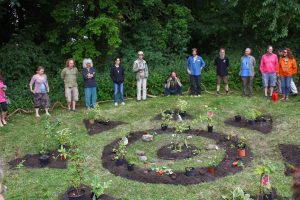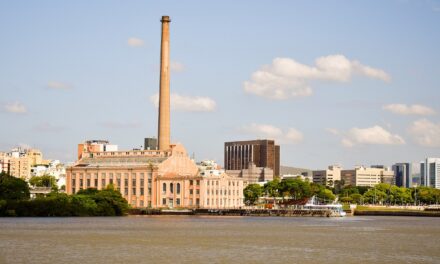By Margie Bushman
 Me and others friends of Santa Barbara Permaculture Network went to Brazil in May 2007 to attend the bi-annually event. We were excited to be going to Brazil to learn about a country most Americans know very little about and see what Permaculture looked like in Brazil. We began our month long adventure in Sao Paulo where the IPC8 was symbolically held in the green heart of the city at Ibirapuera Park.
Me and others friends of Santa Barbara Permaculture Network went to Brazil in May 2007 to attend the bi-annually event. We were excited to be going to Brazil to learn about a country most Americans know very little about and see what Permaculture looked like in Brazil. We began our month long adventure in Sao Paulo where the IPC8 was symbolically held in the green heart of the city at Ibirapuera Park.
A public conference titled “Greening the Economy with Permaculture” was organized to include members of the Brazilian financial community and the media. Bankers, financiers and participants from 42 countries were present including many young Brazilians concerned about their country’s future. As a part of all IPC’s a two week Permaculture design course is offered and this one taught at a children’s center in one of the city’s infamous favelas.In 1978 there was nothing quite like Permaculture, twenty-eight years later Permaculture laps the globe with over 4000 projects across 120 countries. Australian biologist Bill Mollison, founder of the Permaculture movement, has taught and developed projects from the Arctic through Sub-Tropics and Equatorial regions on the planet. And Brazil hosted the 8th International Permaculture Encounter (IPC8).
From Sao Paulo we made our way north to Pirenopolis, near Brasilia, for a Permaculture Designers Convergence hosted by Instituto Permacultura de Cerrado (IPEC). The convergence is the professional in-house event of national conferencing with plenary sessions, presentations and discussions exploring permaculture responses and strategies for a changing world. The IPEC located on a 50 acre site in the beautiful Cerrado (savannah) region is an inspiring example of Permaculture in practice with extensive gardens, educational displays and innovative examples of alternative architecture.
IPEC’s proximity to Brasilia as the seat of national government provides the opportunity to present alternative choices to government policy makers. Many permaculture experts attended the Convergence, including David Holmgren, co-originator of the Permaculture concept, who was asked to make a presentation to the Brazilian Congress about Energy Descent, his ideas on how we might plan for a world with less oil as a cheap and plentiful resource.
Next we traveled to Manuas, the rapidly growing “free trade” city and zone located in the heart of Amazonia, to visit the Instituto Permacultura da Amazonia (IPA). Formed in 1997 as the result of an initiative backed by the United Nations Development Program and the Ministry of Agriculture, IPA was created to establish a sustainable farm on university land and initiate a complementary Permaculture education program. The farm has since become the most influential showpiece of sustainable practices in the Amazon.
A highlight of our trip was a week on the Amazon with thirty IPC8 participants from around the world as we traveled by riverboat to reach the village of Boa Vista do Ramos and its jungle Permaculture center, where programs are expanding to serve an eventual one hundred and fifty river communities. Blissfully without cell phones or laptops for an entire week, we gazed out on an immense waterworld viewing the famous tucuxi river dolphins, elusive manatees, and ponder the idea of dangerous piranhas, electric eels and anacondas below the surface of the river. The hope of permaculture in the region is to provide more sustainable models of agriculture than inappropriate cattle grazing and slash and burn techniques for growing.
 Bahia was our final destination and we were immersed in the exuberant Afro-Brazilian culture. Brazil seems to put its unique stamp on everything and is refreshingly not vulnerable to American pop culture. While there we visited the Organization of Permaculture and Art (OPA), created in 2004 by multicultural artists and educators of diverse backgrounds. OPA is in the process of establishing a center in the historic Pelourinho in Salvador, to demonstrate innovative urban permaculture models and function as a multi-purpose art space.
Bahia was our final destination and we were immersed in the exuberant Afro-Brazilian culture. Brazil seems to put its unique stamp on everything and is refreshingly not vulnerable to American pop culture. While there we visited the Organization of Permaculture and Art (OPA), created in 2004 by multicultural artists and educators of diverse backgrounds. OPA is in the process of establishing a center in the historic Pelourinho in Salvador, to demonstrate innovative urban permaculture models and function as a multi-purpose art space.
They began with “Circo Agua Viva”, a project of environmental education through circus arts and educational theater with underprivileged children and at-risk youth in Salvador. Their ECOSurfista educational program combines Surf and Permaculture on the Bahian coast. Also in the region is the Instituto de Permacultura da Bahia founded by Marsha Hanzi with her important work in the “Sertão” (Drylands in Northeast of Brazil), growing diverse crops in very sandy soils on a 40 acre site.
We enjoyed our time in Brazil immensely, where for the first time an International Permaculture Conference was held in South America. Traditionally IPC’s take place every two years and switch between continents. Past host sites have been in Australia, USA, New Zealand, Scandinavia, Nepal, Croatia and South Africa.
* Margie Bushman is a co-founder of the Santa Barbara Permaculture Network, an educational non-profit founded in 2000 that has sponsored hundreds of workshops and events about permaculture and sustainability to Santa Barbara region. Until recently, Margie was the Program Coordinator for the Santa Barbara City College Center for Sustainability













